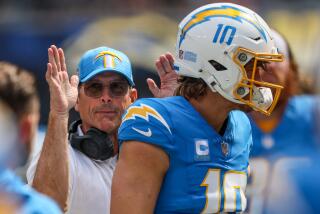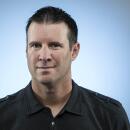In pro sports, hazing is out of the shadows . . . and on the wane
- Share via
The lockout might not be the only thing that ended in the NFL. Hazing seems to be on the endangered list too.
The Dallas Cowboys and Jacksonville Jaguars recently curbed the decades-old practice of veterans’ roughing up rookies, setting an apparent trend of limiting the embarrassing incidents involving first-year players.
There’s a long tradition of rookies being tied to goal posts, singing off-key songs in front of teammates and donning silly costumes at training camp.
But is hazing now considered hazardous?
“There’s not going to be anything demeaning in any way that a rookie has to do,” Cowboys Coach Jason Garrett told reporters. “We don’t believe in that.”
Garrett was an assistant coach last season when Cowboys receiver Dez Bryant made national headlines by refusing to carry the equipment of veteran receiver Roy Williams.
In an era when rapid player turnover is common, rookies are increasingly put in position to contribute right away in the NFL.
In Jacksonville, where rookie quarterback Blaine Gabbert is the face of the future, hazing is being swept out the back door.
“The whole thing really had gotten carried away in recent years,” Jaguars Coach Jack Del Rio told reporters.
There will still be an annual rookie “talent show” in Jacksonville, and players have to carry teammates’ equipment, but no eyebrows will be shaved and no awful haircuts will be given.
In fact, there might not be a worse haircut than the Friar Tuck offshoot Denver quarterback Tim Tebow received as a rookie last year.
“Hazing definitely has a negative impact on people and their self-esteem,” said Bob Corb, director of the sport psychology program at UCLA. “It makes it hard to feel inspired. It could affect your trust. Coaches are figuring out that how a player feels about himself, his teammates and his coaches will affect his performance. It’s like ‘Why are we going through this?’ It’s hard to see what’s redeeming about hazing people.”
The recent history of hazing runs from innocuous to injurious, and includes the NBA and Major League Baseball.
Clippers forward Blake Griffin was forced to wear a pink Dora the Explorer backpack to ferry teammates’ sweat bands and socks. He laughed it off. Then he became the NBA’s rookie of the year.
Minnesota Timberwolves forward Kevin Love said he had to sing “Happy Birthday” to teammates if the date fell on a home game during his rookie season.
Cincinnati Reds outfielder Chris Heisey found a schoolgirl outfit hanging in his locker late last season. It was picked out by veterans on the team for the rookie to wear on a trip.
Initiation incidents went a step further when New Orleans Saints rookies Cam Cleeland and Jeff Danish were injured after being gang-rushed by teammates at training camp in 1998.
Cleeland sustained an eye injury after being clubbed by a bag of coins, and Danish was hospitalized after being shoved through a window. Danish won an undisclosed sum after suing the Saints, an assistant coach and a half-dozen players for more than $650,000 in damages.
Football is the king of hazing, given its ultra-physical nature and the simple fact there are sometimes a dozen rookies on a team.
There is anecdotal evidence that pro baseball has more hazing than the NBA, but it appears to be shrinking in the former, with schoolgirl costumes slightly more an exception than a rule.
“It’s changed,” Baltimore Orioles Manager Buck Showalter told the Associated Press. “In fact, I’m kind of glad it changed. I’ve never been a big fan of the whole thing.”
Said former Florida Marlins infielder Wes Helms: “It definitely has calmed down over the years. Rookies are a little different nowadays. When I came up, you didn’t say a word until you had two or three years in the big leagues. Now guys come up and it’s like they’re already comfortable.”
Corb, the clinical sport psychologist, said he understood the need for rookies to prove themselves in games to earn greater respect. They should also stay after practice to work on technique and put in extra hours away from the field to learn the playbook.
Corb was even fine with a type of class system based on seniority, such as better locker position, but said the premise of hazing should be left behind.
“I’m not so sure the people who do it even enjoy it,” Corb said. “I’ve never met Derek Jeter or Tom Brady, but they seem like good guys. I can’t imagine they would enjoy conducting this rite of passage.”
twitter.com/Mike_Bresnahan
More to Read
Go beyond the scoreboard
Get the latest on L.A.'s teams in the daily Sports Report newsletter.
You may occasionally receive promotional content from the Los Angeles Times.











